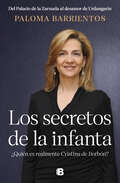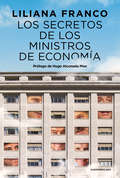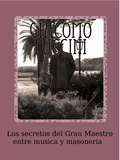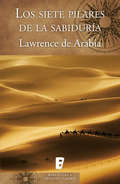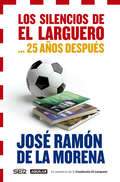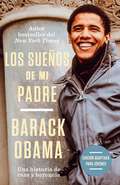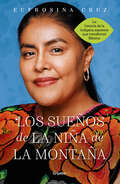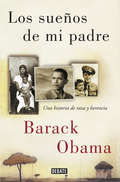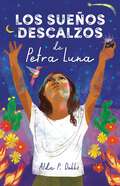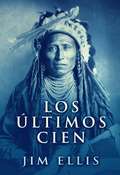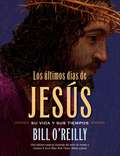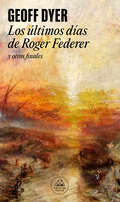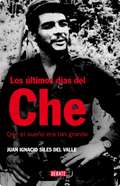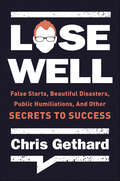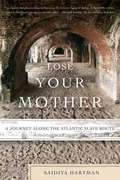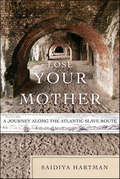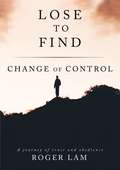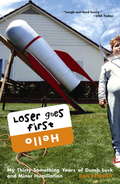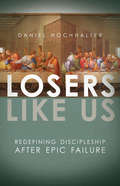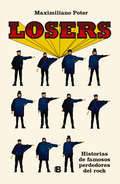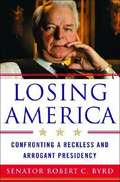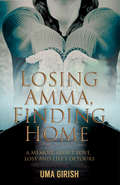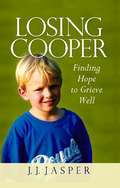- Table View
- List View
Los secretos de la infanta: Del Palacio de la Zarzuela al desamor de Urdangarin
by Paloma BarrientosUn libro revelador, minucioso y sorprendente que retrata sin tapujos a Cristina de Borbón, la protagonista del mayor escándalo en la historia de la monarquía española. Paloma Barrientos retrata sin tapujos a la protagonista del mayor escándalo en la historia de la monarquía española. ¿Quién es realmente Cristina de Borbón? ¿Cómo llegó esa niña que jugaba a la pelota en los jardines de la Zarzuela a sentarse en el banquillo como imputada frente al juez Castro? ¿Qué escondían las imágenes idílicas del papel cuché? ¿Realmente fue alguna vez la mujer sencilla y discreta que parecía? La infanta Cristina fue durante muchos años la más desconocida de los hijos de los Reyes. La mediana de la familia atrajo menos atención que sus hermanos, y creció pensando que podía pasar desapercibida. Se acostumbró a una vida independiente, cómoda y suntuosa, en la que todos sus deseos eran satisfechos de inmediato. La periodista Paloma Barrientos recrea con lujo de detalles la trayectoria vital de la infanta, desde su infancia hasta la imputación por el Caso Nóos.
Los secretos de los ministros de Economía
by Liliana FrancoLas mejores anécdotas que desde el regreso de la democracia esconden las paredes y pasillos del Palacio de Hacienda. ¿Cómo se gestó la salida de Luis Caputo del Banco Central? ¿A qué ministro apodan Chocoarroz? ¿Qué hizo Amado Boudou con su despacho? ¿Cómo recuerdan en el Ministerio a Roberto Lavagna, Alfonso Prat-Gay, Axel Kicillof y Guillermo Nielsen? ¿Cómo fueron las eternas peleas con el Fondo Monetario Internacional? ¿Quién fue el mejor jefe? ¿Y el peor? La preocupación por la economía ocupa los primeros puestos de las encuestas porque -para bien o para mal- afecta la vida cotidiana y determina nuestro futuro. Pensamos que, antes de ser tomadas, las medidas son analizadas, sopesadas y debatidas por expertos. Si la realidad a veces nos hace dudar de ello, Los secretos de los ministros de Economía revela que ese recelo puede ser acertado. Como hizo en Los secretos de la Casa Rosada, Liliana Franco nos guía esta vez por las oficinas, las salas y los pasillos del Palacio de Hacienda. Tras años de trabajo en ese ámbito, ella como pocos conoce el detrás de escena de muchas decisiones controversiales y los aspectos ocultos del ascenso o la caída de personajes clave. A su manera, las historias de este libro muestran un costado desconocido de las formas en que los gobernantes y sus funcionarios más cercanos ejercen el poder; y pueden explicar cómo nos va...
Los secretos del Gran Maestro entre música y masonería
by Paolo Nuti Heredia RojasGiacomo Puccini y la masonería: ¿que vínculo hay entre uno de los mas grandes compositores italianos de todos los tiempos y la controversial institución? En un inteligente tejido entre novela y autobiografía el autor nos ofrece anécdotas personales y referencias históricas, levantando dudas, poniendo interrogantes, y acompañando al lector en un fascinante viaje de descubrimiento a los secretos del Gran Maestro.
Los siete pilares de la sabiduría
by T.E. Lawrence (Lawrence de Arabia)La crónica personal de un aventurero de comienzos del siglo XX, T. E. Lawrence: un miembro del Gobierno británico que termina convirtiéndose en un héroe de la resistencia árabe. En los preludios de la Primera Guerra Mundial, en pleno apogeo del colonialismo europeo, un agente del Gobierno británico se interna en la península arábiga con la finalidad de subyugar una inminente rebelión anticolonial. El emisario es cuestión recorre, bajo un sol abrasador, amplias regiones desérticas. Trata con los enemigos del Imperio Británico, conoce sus constumbres y se gana su confianza. Se convierte en uno de ellos... y actúa de forma subrepticia a favor de los intereses de la metrópli, aunque le repugna tanto ejercer ese papel que acaba simpatizando con la causa árabe.
Los siete pilares de la sabiduría
by T.e. Lawrence de ArabiaEsta es la crónica personal de un aventurero de comienzos del siglo XX, T. E. Lawrence: un lacayo del Gobierno británico que termina convirtiéndose en un héroe de la resistencia árabe. En los preludios de la Primera Guerra Mundial, en pleno apogeo del colonialismo europeo, un agente del Gobierno británico se interna en la península Arábiga con la finalidad de yugular una inminente rebelión anticolonial. El emisario es cuestión recorre, bajo un sol abrasador, amplias regiones desérticas. Trata con los enemigos del Imperio Británico, conoce sus constumbres y se gana su confianza. Se convierte en uno de ellos... y actúa de forma subrepticia a favor de los intereses de la metrópli, aunque le repugna tanto ejercer ese papel que acaba simpatizando con la causa árabe.
Los silencios de El Larguero... 25 años después
by José Ramón De la MorenaUno de los periodistas más representativos del mundo del deporte repasa los 25 años de El Larguero El Larguero, veinticinco años de historias deportivas, de triunfos y derrotas, de anécdotas y reflexiones, de desvelos y alegrías... un cuarto de siglo de la mejor radio. José Ramón de la Morena, el locutor deportivo más reconocido y prestigioso del periodismo español, nos acompaña en un viaje al pasado y al presente de uno de los espacios con más solera de la radio española, en antena desde hace veinticinco años y líder indiscutible desde hace casi veinte. Los silencios de El Larguero... 25 años después no es sino una muestra de gratitud y un homenaje a todos aquellos que desde sus casas se han emocionado con cada una de las historias narradas a través de las ondas y que han compartido junto a De la Morena los momentos y personajes clave en esta época tan brillante de nuestro deporte. A modo de diario, el estilo sencillo, cómplice, valiente e íntimo de José Ramón nos devuelve recuerdos, haciéndonos partícipes de las gestas, entre otros, de Fernando Alonso, Iniesta, Nadal o Casillas, al tiempo que nos transmite sus reflexiones más personales y sus propias vivencias sobre el oficio del periodismo. Un libro por y para los oyentes de uno de los programas míticos de la radio. Este libro recoge episodios que recorren los últimos veinticinco años a través de la historia de un periodista, José Ramón de la Morena, y un programa de radio, El Larguero. La última parte es un diario de este último año, confesiones que José Ramón ha ido escribiendo cada día, siempre a mano, con un rotulador negro de punta fina sobre un bloc amarillo. Páginas escritas en horas de sueño, en viajes, en la radio..., siempre con sinceridad y con pasión, que es como José Ramón entiende la radio. Son experiencias, historias y recuerdos que, como dice elautor, pertenecen a los oyentes, las necesitan para resolver las dudas que les crea. Los periodistas suscitan la curiosidad de saber cómo son y en este libro José Ramón se ha «desnudado» ante sus oyentes y lectores y les ha dado la oportunidad de saber lo que piensa y cómo trabaja, su visión particular de los acontecimientos.
Los sueños de mi padre. Edición para jóvenes / Dreams from My Father (Adapted for Young Adults)
by Barack ObamaAhora adaptadas para jóvenes, las memorias bestseller #1 del New York Times que Toni Morrison llamó “realmente extraordinarias” ofrecen una mirada íntima a los primeros años de Barack Obama. Se trata de un viaje fascinante que traza la odisea familiar, racial y de identidad del futuro cuadragésimo cuarto presidente. El retrato revelador de un joven hombre negro cuestionándose sobre el autodescubrimiento y la pertenencia… mucho antes de convertirse en una de las voces más importantes de Estados Unidos. Esta edición única incluye una nueva introducción del autor, un inserto de imágenes a color y un árbol genealógico. Hijo de una madre blanca de Estados Unidos y un padre negro de Kenya, Obama nació en Hawai, donde vivió hasta los seis años, cuando se mudó con su madre y su padrastro a Indonesia. A los doce años regresó a Hawai para vivir con sus abuelos. Obama lleva a sus lectores consigo mientras enfrenta los retos en high school y universidad, en su vida en Nueva York, al convertirse en organizador comunitario en Chicago y al viajar a Kenya. A través de tales experiencias forma un compromiso duradero con el liderazgo y la justicia. Contado a través de las relaciones con su familia —la madre y los abuelos que lo criaron, el padre que consideraba más mito que hombre y el clan familiar que conoció en Kenya por primera vez—, Obama hace frente a la complicada verdad de la vida y el legado de su padre, y termina por abrazar su origen dividido. En su viaje hacia la edad adulta desde sus humildes inicios, se forja su propio camino mediante ensayo y error, mientras permanece siempre conectado con sus raíces. Barack Obama está decidido a llevar una vida de servicio, con propósito y autenticidad. Su poderosa autobiografía inspirará a los lectores a examinar de dónde vienen y hasta dónde son capaces de llegar.
Los sueños de la niña de la montaña: Memoria de una utopia cumplida
by Eufrosina Cruz MendozaEste libro cuenta una historia de terquedad y rebeldía. La de una niña que a los 12 años decidió escribir su destino y, de paso, ayudar a miles y miles de mexicanas a cambiar su suerte Soy Eufrosina Cruz y nací en la montaña zapoteca. A los 27 años gané la presidencia de mi pueblo, pero no me dejaron gobernar porque era mujer. En ese momento supe que, para cambiar mi vida y la de las mujeres indígenas, debía transformar la ley más importante de mi país. Desde entonces, mi lucha ha sido para que los pueblos indígenas y afro no sean considerados menores de edad y para que las mujeres no sean personas de segunda. En este viaje he logrado modificar la Constitución de mi estado, cambiar la Constitución de México y que la onu adoptara mi iniciativa contra el sexismo y la discriminación. Pero lo que más me enorgullece es que he podido decirles a las niñas que tienen derecho a ser quienes quieran, a que su origen no defina su destino y a que pueden cumplir sus sueños, tal como lo hizo esta niña de las montañas.
Los sueños de mi padre: Una historia de raza y herencia
by Barack ObamaEn estas memorias líricas y absorbentes, publicadas originalmente en 1995, el hijo de un africano negro y una estadounidense blanca busca su camino como afroamericano. Las memorias que Obama relata en Los sueños de mi padre comienzan en Nueva York, donde se entera de que su padre ha fallecido en un accidente automovilístico. La inesperada noticia provoca en él un viaje físico y emocional que lo lleva de Kansas a Hawái y más tarde a Kenia, en una emotiva odisea que le permitirá conocer realmente a su familia, la amarga verdad de la vida de su padre y conciliar al fin las distintas partes de su fragmentada herencia. Reseñas:«Provocador... Describe convincentemente el hecho de pertenecer a dos mundos diferentes y, por tanto, de no pertenecer a ninguno.»New York Times Book Review «De una manera fluida, tranquila y perceptiva, Obama nos guía directamente al sitio donde se cruzan los interrogantes más serios sobre identidad, clase y raza.»Washington Post Book World
Los sueños descalzos de Petra Luna
by Alda P. DobbsBasado en una historia real, este es el intrépido y arriesgado viaje de una niña que va rumbo a cruzar la frontera hacia los Estados Unidos para trasladar a su familia a un lugar seguro durante la Revolución Mexicana. Es 1913 y la mamá de Petra Luna, una niña de doce años, ha muerto mientras la Revolución hace estragos en México. Antes de que los soldados se llevaran a su papá, Petra le promete que cuidará de la familia que le queda: su abuelita, su hermana pequeña Amelia y su hermanito Luisito, hasta que puedan reunirse con él. Juntos huyen hacia el norte mientras arde la ciudad que dejaron atrás, y cruzan el desierto cruel e inhumano en busca de un refugio seguro en un mundo que no ofrece muchos. Cada noche cuando Petra cierra los ojos, añora todos sus sueños, especialmente su anhelado deseo de aprender a leer. Abuelita llama a esos sueños “sueños descalzos”: "Son como nosotros, indios y campesinos descalzos. . . no están destinados a ir muy lejos". Pero Petra se niega a escuchar. Atravesando desiertos y campos de batalla, hambre y miedo, Petra no se detendrá ante nada para mantener a salvo a su familia y guiarlos hacia una vida mejor al otro lado de la frontera de EE. UU., un lugar donde sus sueños descalzos finalmente podrían convertirse en realidad.
Los Últimos Cien: Una Novela De Las Guerras Apaches
by Jim EllisLa década de 1920 en México y el suroeste de Estados Unidos tienen muchos peligros, ya que los últimos bastiones Apaches persisten contra los invasores extranjeros. Duro como clavos, el militar confederado Jock MacNeil recibe una invitación inesperada para guiar a los fugitivos de una reserva a una fortaleza en Sierra Madre. Frente a las autoridades mexicanas y estadounidenses, y a las Guerras Apaches propagándose alrededor de ellos, Jock es testigo de primera mano de los terrores de la guerra y de su propia transformación de ser un hombre de fe a la Espiritualidad Apache.
Los Últimos días de Jesús (The Last Days of Jesus)
by Bill O'Reilly William Low Carlos Uxo Cobalt Illustrations Studio, IncHace dos mil años, Jesús caminó por Galilea; allá donde viajaba, más y más personas se convertían en sus seguidores. Sus contemporáneos son figuras históricas conocidas: Julio César, César Augusto, Herodes, Poncio Pilatos. Aquella era una época de una opresión omnipresente, en la que hombres, mujeres y niños se hallaban bajo el brutal poder del Imperio Romano. Jesús vivió en este mundo; en un contexto política e históricamente volátil en el que también murió, cambiando el mundo para siempre. Adaptado del gran éxito de ventas de Bill O'Reilly, el thriller histórico Matar a Jesús, y con vistosas y detalladas ilustraciones, Los últimos días de Jesús es una explicación, fascinante y basada en hechos, de la vida y los tiempos de Jesús, ahora disponible en español.
Los últimos días de Roger Federer: y otros finales
by Geoff DyerUnapoderosa reflexión sobre hallar propósito en el ocaso de nuestras vidas.«Dyer, que se ha propuesto escribir un libro sobre los finales, se siente atraído por la infinitud, por la forma en que una cosa lleva a la otra [...]. Hay pasajes realmente magníficos, algunos fragmentos de crítica maravillosos, algunas apasionantes descripciones de psicodélicos».The New York Times¿Qué ocurre con la carrera de grandes artistas y atletas cuando llegan a la vejez? ¿Alcanzan una serenidad renovada o sucumben al tormento? A medida que nuestro cuerpo y nuestra mente se deterioran, ¿cómo seguir adelante?Geoff Dyer reflexiona sobre las secuelas del paso del tiempo y se fija en los últimos días de grandes escritores, pintores, futbolistas, músicos y estrellas del tenis (sí, también Roger Federer). Con un tono mordaz y una lucidez inigualables, Dyer nos acerca a momentos críticos de genios que cedieron física o mentalmente cuando sus carreras alcanzaron la cúspide o que se reinventaron desafiando las convenciones. Entre su exquisita selección, Dyer nos confía el deterioro mental de Nietzsche, los nuevos sonidos que Dylan encontró tras una crisis creativa, las últimas pinturas con cierto aire abstracto de Turner, la brillante pluma de Jean Rhys en su madurez y los mágicos cuartetos finales de Beethoven.Los últimos días de Roger Federer es una ingeniosa y festiva reflexión sobre la finitud y sobre el arte como modo de perdurar en el tiempo. Una obra conmovedora, ágil y lúcida que nos devuelve la esperanza de hallar sentido a los últimos años de la vida. La crítica ha dicho:«Un tesoro nacional».Zadie Smith«Dulcemente transcendental. [...] Un libro que, a pesar de tratar un tema sombrío, rebosa energía y su voz resuena alegremente».The Sunday Times«Qué sensibilidad tiene charlando con el lector de una manera cálidamenteamigable,con su prosa salpicada de humor autocrítico y notas al pie, su erudición para nada pomposa o trivial».The Daily Telegraph«La madurez le ha llegado, pero la juventud no se ha ido. Son los soportes para las rodillas en ambas piernas los que ahora lo mantienen en la cancha de tenis, pero, al igual que Federer, lo que lo mantiene en el juego es una mezcla de estilo, toque, sincronización y buen ojo».The Guardian
Los últimos días del Che
by Juan Ignacio Siles del ValleMucho se ha escrito sobre la trayectoria, vida y mito de Ernesto Che Guevara. Sin embargo, son escasos los trabajos de investigación histórica que permiten conocer de primera mano -gracias a un pormenorizado estudio de documentación inédita, fuentes orales y expedientes- la aventura del Che en Bolivia, el periplo que le costó la vida al «guerrillero heroico» un ya lejano octubre de 1967. Juan Ignacio Siles, profesor y especialista en guerrilla latinoamericana, ha tenido acceso a numerosos diarios de guerrilleros, escuchado a los campesinos que le conocieron, recuperado informes de la policía y el ejército que par ticipó en la captura, y analizado con detalle el Diario de Bolivia del Che con el fin de escribir un texto brillante y preciso, poético y analítico, donde la información se cruza con la tragedia, el dato con el sentimiento y la verdad con la pasión narrativa. Escrito con el brío de las mejores novelas de acción, este texto posibilita una lectura coral y poética de unos de los momentos estelares de la guerrilla latinoamericana. Paisaje con figuras, evocación histórica, política y literaria, esta obra retrata con detalle la pasión y muerte de uno de los iconos del siglo XX.
Lose Weight 4 Life: My blueprint for long-term, sustainable weight loss through Motivation, Measurement, Movement, Maintenance
by Tom Watson'An honest and fascinating account of the journey that Tom made from discovering he was a type 2 diabetic to doing something about it. This book will change lives.' Michael Mosley, on The Sunday Time's bestseller DownsizingFrom the bestselling author of Downsizing, a guide to losing weight - and keeping it off - as well as improving health, from someone who has successfully done both, Lose Weight 4 Life outlines the programme Tom Watson followed for his own remarkable 8-stone (50kg) weight loss. Divided into 4 sections - Motivation, Movement, Measurement and Maintenance - it includes relatable examples of Tom's own, often bumpy, journey to better health, which saw him transform from someone who mindlessly hoovered up entire packets of biscuits at one go and had to rummage in the XXXL bin for exercise gear into someone who rowed the length of the UK. Packed with practical advice backed up by the latest research, Lose Weight 4 Life demonstrates that it is never too late to turn things around, even if you are someone who has failed umpteen times before.
Lose Well: False Starts, Beautiful Disasters, Public Humiliations, and Other Secrets to Success
by Chris Gethard“If anyone can get you to give your dreams an honest shot, it’s Chris Gethard, the king of somehow turning defeats into victories.” —Judd Apatow, comedian, writer, and directorA laugh-out-loud, kick-in-the-pants self-help narrative for anyone who ever felt like they didn’t fit in or couldn’t catch a break—comedian and cult hero Chris Gethard shows us how to get over our fear of failure and start living life on our own terms.Setting flame to vision boards and tossing out the “seven simple steps” to achieving anything, the host of the eponymous TruTV talk show and the wildly popular podcast Beautiful Stories from Anonymous People illustrates his personal and professional manifesto with hilarious and ultimately empowering stories about his own set-backs, missteps, and public failures, from the cancellation of his Comedy Central sitcom after seven episodes to rediscovering his comedic voice and life’s purpose on a public access channel.With his trademark wit and inspiring storytelling—a cross between David Sedaris and Jenny Lawson—Gethard teaches us how to power through our own hero’s journey, whether we’re a fifteen-year-old starting a punk band or a fifty-year-old mother of three launching an Etsy page. In the process, he shows us how to fail with grace, laugh on the way down, and as we dust ourselves off, how to transform inevitable failures into endless opportunities.“Chris speaks inspirational life truths to the outsider in all of us. A pithy road map of the antiestablishment path by which one can succeed in comedy and life” —Nick Offerman“Will change the way you think about failure. It’s funny, heartfelt, and full of advice that every creative person needs to hear.” —Hello Giggles
Lose Your Mother: A Journey Along the Atlantic Slave Route
by Saidiya HartmanIn Lose Your Mother, Saidiya Hartman traces the history of the Atlantic slave trade by recounting a journey she took along a slave route in Ghana. Following the trail of captives from the hinterland to the Atlantic coast, Hartman reckons with the blank slate of her own genealogy and vividly dramatizes the effects of slavery on three centuries of African and African-American history. The slave, Hartman observes, is a stranger, one torn from family, home, and country. To lose your mother is to be severed from your kin, to forget your past, and to inhabit the world as an outsider, an alien. There are no known survivors of Hartman's lineage, no relatives in Ghana whom she came hoping to find. She is a stranger in search of strangers, and this fact leads her into intimate engagements with the people she encounters along the way and draws her deeper into the heartland of slavery. She passes through the holding cells of military forts and castles, the ruins of towns and villages devastated by the trade, and the fortified settlements built to repel predatory armies and kidnappers. In artful passages of historical portraiture, she shows us an Akan prince who granted the Portuguese permission to build the first permanent trading fort in West Africa, a girl murdered aboard a slave ship, and a community of fugitives seeking a haven from slave raiders.
Lose Your Mother: A Journey Along the Atlantic Slave Route
by Saidiya HartmanIn Lose Your Mother, Saidiya Hartman journeys along a slave route in Ghana, following the trail of captives from the hinterland to the Atlantic coast. She retraces the history of the Atlantic slave trade from the fifteenth to the twentieth century and reckons with the blank slate of her own genealogy.There were no survivors of Hartman's lineage, nor far-flung relatives in Ghana of whom she had come in search. She traveled to Ghana in search of strangers. The most universal definition of the slave is a stranger—torn from kin and country. To lose your mother is to suffer the loss of kin, to forget your past, and to inhabit the world as a stranger. As both the offspring of slaves and an American in Africa, Hartman, too, was a stranger. Her reflections on history and memory unfold as an intimate encounter with places—a holding cell, a slave market, a walled town built to repel slave raiders—and with people: an Akan prince who granted the Portuguese permission to build the first permanent trading fort in West Africa; an adolescent boy who was kidnapped while playing; a fourteen-year-old girl who was murdered aboard a slave ship.Eloquent, thoughtful, and deeply affecting, Lose Your Mother is a powerful meditation on history, memory, and the Atlantic slave trade.
Lose to Find: Change of Control
by Roger LamRoger Lam thought he was done with writing after pouring 46 years&’ worth of his life lessons into his first book, Lost and Found: Money vs. Riches. That was almost certainly the case until multimedia messages from God led him to liquidate his entire equity portfolio in early February 2018, followed by an unbelievably supernatural confirmation the following morning. Immediately, deep in Roger Lam&’s heart he knew this was a story that had to be told for the glory of God, but little did he know that this dramatic conclusion to his pledge for church premises pales in comparison to what God had planned ahead for him in the rest of 2018.Lose to Find: Change of Control reads like a Christ follower&’s diary of wrestling with surrender. Despite constantly feeling like the most unlikely spokesperson and champion for stewardship and generosity, it became clear to Roger Lam that God was not satisfied to leave the other areas of his life besides money remaining in his control--his vocation, safety and purpose. Continuing in the same authenticity and conversational tone for which readers around the world have shown appreciation in his first book, Roger Lam humorously shares his continued God-ordained spiritual transformation, going beyond the area of money which (he thought) he had already mastered. This new leg of his Spirit-filled journey entails unimaginable, interlinked supernatural adventures starting in Hong Kong, followed by divine appointments in Beijing, Tel Aviv, Jerusalem, South India, Shanghai and Washington D.C. all within a calendar year.
Loser Goes First: My Thirty-something Years of Dumb Luck and Minor Humiliation
by Dan KennedyIt all begins on Christmas morning, 1978. Dan Kennedy is ten years old and wants a black Gibson Les Paul guitar, the kind Peter Frampton plays. It will be his passport to the coolest (only) band in the neighborhood--Jokerz. He doesn't get it. Instead, his parents present him with what they think he wants most, a real-estate loan calculator (called the Loan Arranger) and a maroon velour pullover shirt with a tan stripe across the chest. It is the first of what will become a lifetime of various-sized failures, misunderstandings, comical humiliations, and just plain silly choices that have dogged this "hipster Proust of youthful loserdom," as author Jerry Stahl has so eloquently called Mr. Kennedy. Dan's hilarious and painfully awkward youth soon develops into a . . . uh . . . hilarious and painfully awkward adulthood. His first two choices for university are Yale (Lit or Drama) and Harvard (Business), so he reviews his high school transcripts and decides on Butte Community College in Oroville, California, where he studies for about four and a half weeks. We could go on here and describe in detail all of Dan's good-natured stabs at ambition, but he, himself, sums it all up quite nicely: "If you've ever tried and failed miserably at being a rock star (no guitar/talent), a professional bass fisherman, an extra in the movie Sleepless in Seattle (guy drinking martini in bar while Tom Hanks makes a phone call), a Madison Avenue advertising executive, a clerk/towel person at a suburban health club (named Kangaroo Kourts), an espresso street-cart owner and operator (in the one neighborhood of that coffee-swilling town, Seattle, where, remarkably, no one really seems to drink coffee), a dot. com millionaire, an MTV VJ, or a forest fire fighter, this book is for you. " Along the way, a few lessons are learned and we are treated to one of the most original, riotously funny, unsentimental, and offbeat memoirs in recent history. Dan's a favorite in McSweeney's and at the very popular Moth readings in New York City. We should be happy that he failed so miserably at so many things--and took notes! From the Hardcover edition.
Losers Like Us: Redefining Discipleship after Epic Failure
by Daniel HochhalterIn 2008, after seven years of preparation, Daniel Hochhalter permanently failed his PhD, leaving him with no refunds, no transferable credits, no recourse to appeal or try again, and no hope of gaining the qualifications needed for his desired career. Then he lost his job. Devastated and in crisis, with no Plan B and no clue how to redeem his future, he looked to the twelve disciples and discovered that--despite their gaping faults and sins--God still loved them and used them to change the world. With fresh warmth and wisdom, ample hope and humor, Losers Like Us skillfully intertwines Dan's own story with theirs to show how our worst mistakes and greatest failures bring us to a place of teachableness, egolessness, brokenness, and empathy--the very qualifications required to receive God's love and grace, and to manifest his kingdom on earth.
Losers: Historias de famosos perdedores del rock
by Maximiliano PoterMaxi Poter (re)descubre a esos músicos a los que el destino les jugó una broma pesada que los dejó en el backstage de la gloria. Los artistas que -por azar, tragedias, desencuentros, traiciones, pifies, pelotas en el palo, confusiones y tropiezos cósmicos- se quedaron viendo la consagración desde afuera. Alguna vez The Police fue un desastroso cuarteto. Los Rolling Stones eran seis, pero a uno lo echaron por "feo". En varios países, los Beatles fueron John, Paul, George y un tal "Jimmie". Kiss tuvo un guitarrista con artrosis y Led Zeppelin casi elige al cantante más desafortunado del mundo. La biografía de los más grandes íconos del rock está llena de ilustres desconocidos que, por diversas razones, se quedaron al borde de la fama y hoy son ocultas notas al pie de mitos y leyendas. Maximiliano Poter (re)descubre y (re)valoriza a los otros "Pete Best" de la historia: esos músicos que aun teniendo todo lo que hace falta (talento, carisma, atractivo, dedicación, oportunismo, contactos y hasta la imprescindible "suerte") se quedaron en el backstage de la gloria. Losers reúne las maravillosas y agridulces vidas de esos desdichados que son parte fundamental de la crónica universal del rock pero que -por azar, tragedias, peleas, traiciones, pifies, confusiones, macanas, pelotas en el palo y hasta injusticias cósmicas- no recibieron su merecida consagración. Estos son los más exitosos "casi famosos".
Losing America: Confronting a Reckless and Arrogant Presidency
by Robert C. ByrdThe long-time Democratic Senator from West Virginia gives his perspective on Bush's policies, drawing on his experience as a senator since the Kennedy era, as well as his knowledge of America's history and Constitution.
Losing Amma, Finding Home: A Memoir about Love, Loss and Life's Detours
by Uma GirishUma Girish’s Losing Amma, Finding Home is a heart-rending narrative of losing a parent, living through the pain and transforming it to discover one true-calling and life’s purpose. This is a breathtaking inspirational and personal memoir that will ring true with every reader! When Uma arrives to start life in a Chicago suburb with her husband, 14-year-old daughter and her dreams in the spring of 2008, she has no clue of the cosmic wheels in motion. Barely four weeks later, her 68-year-old mother, in India, is diagnosed with Stage 4 breast cancer. Eight months later, she passes away. Losing her mother plunges Uma into the deepest despair, but more importantly, awakens a sudden clarity and knowing that ‘there has to be more to life than this’. As she begins to navigate a new country and culture, she is also called on to navigate the lonely terrain of grief. Life begins to open doors and Uma finds comfort, connection and purpose in working with seniors at a retirement community. Every relationship that she forms with the seniors opens her heart a little wider as she seeks answers to the only questions that matter. Who am I? Why am I here? What am I meant to do with this life? Interweaving two cultures through a textured narrative, Uma uncovers the truths of her inner journey as she transforms – one event, one person at a time.
Losing Cooper: Finding Hope To Grieve Well
by J. J. JasperA true story of hope in the midst of great personal tragedy. Losing Cooper: Finding Hope to Grieve Well, is the moving story of the Jasper family after the tragic death of their five-year-old son Cooper. The book chronicles their journey through darkness, but offers real hope to anyone experiencing trouble, trials or tragedy. It shows how a strong Christian family deals with shock, loss and grief from a Biblical perspective.
